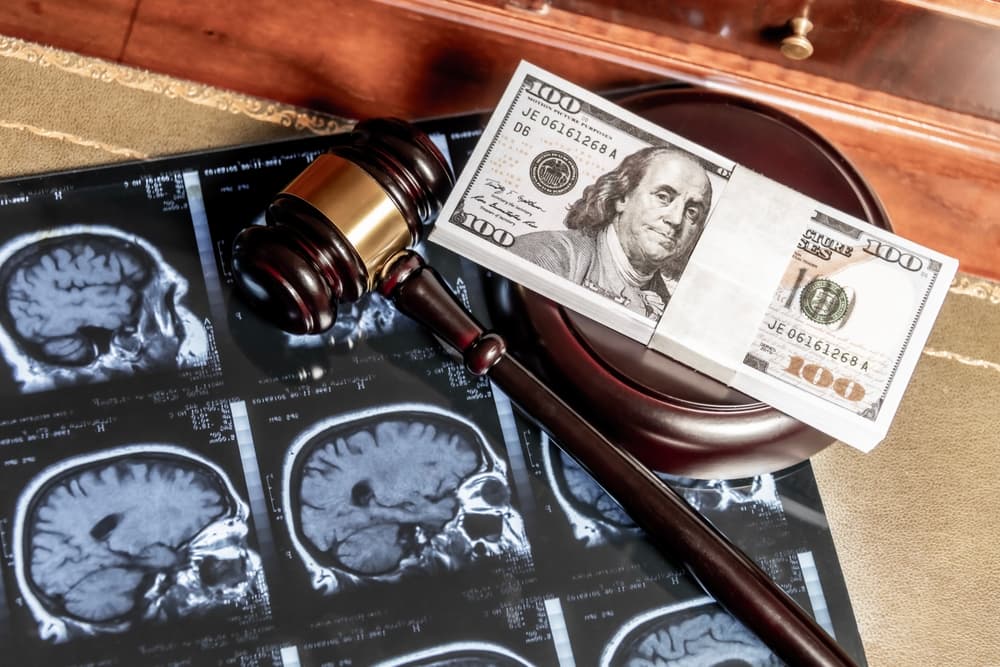Head injuries are among the most serious and life-altering injuries a person can suffer. These injuries can range from moderate to severe traumatic brain injuries (TBIs) and can have lasting physical, emotional, and financial consequences.
If you or a loved one has suffered a head injury due to another party’s negligence, you may be entitled to significant compensation. But how much is a head injury claim worth? The answer depends on multiple factors, including the injury’s severity, the accident’s circumstances, and the impact on the victim’s life.
After sustaining a head injury, do not hesitate to discuss your situation with a qualified attorney. A San Jose personal injury lawyer with experience in head injuries can guide you through the legal process and work diligently to get you the justice and compensation you deserve.
What is a Head Injury?

A head injury refers to any damage to the skull, scalp, or brain. These injuries can be classified into two broad categories: open-head injuries and closed-head injuries.
Open head injuries occur when an object penetrates the skull, exposing or damaging brain tissue. These injuries often result from severe accidents, such as gunshot wounds or construction site incidents involving falling objects.
Closed head injuries involve internal damage to the brain without penetration to the skull. These injuries are more common and can result from blunt force trauma, such as hitting one’s head in a vehicular collision.
Both types of head injuries can cause significant physical, cognitive, and emotional impairments, sometimes requiring long-term medical care and rehabilitation.
Common Types of Head and Brain Injuries
Trauma to the head can result in a wide variety of injuries to the head and brain, including traumatic brain injuries. Some of the more common kinds of injuries include:
- Concussions: One of the most frequently sustained brain injuries, concussions occur when a blow to the head disrupts brain function. Symptoms may include headaches, dizziness, confusion, and memory problems.
- Contusions: Contusions cause bruising of the brain tissue caused by direct impact, often leading to swelling and neurological issues.
- Diffuse Axonal Injury (DAI): DAIs are a severe form of brain injury caused by rapid acceleration or deceleration forces, leading to widespread brain damage.
- Hematomas: Blood clots can form in the brain due to ruptured blood vessels. If not treated promptly, these can be life-threatening.
- Skull fractures: The skull is a bone like any other in the body. Breaks in the skull can be dangerous, especially because if fragments penetrate brain tissue, they can cause brain damage.
It is possible to recover from a head or brain injury, depending on the severity of the injury. However, in many cases, victims are left with life-changing consequences, including seizures and chronic headaches, and a greater chance of developing other issues, such as Alzheimer’s Disease and Dementia.
According to the CDC, traumatic brain injury survivors face major difficulties. Five years after injury, 57 percent are moderately or severely disabled, 55 percent are left without a job, and 33 percent rely on others for assistance with everyday activities. Statistics like these highlight the importance of taking action and seeking financial compensation right away. Securing adequate compensation can help ensure you can meet both your present and future needs.
Causes of Head Injuries
Head and brain injuries can occur in various scenarios, resulting in trauma to the head and neck region. Some of the common cases include:
- Auto collisions: Car accidents often cause drivers and passengers to strike their heads on steering wheels, dashboards, or windows.
- Truck accidents: Due to the massive size and force of commercial trucks, victims often sustain severe head trauma in crashes.
- Motorcycle crashes: Even with helmets, motorcyclists are at high risk of head injuries due to the lack of protection from impact.
- Bicycle accidents: Cyclists can suffer serious head injuries when struck by motor vehicles or when falling onto hard surfaces.
- Pedestrian accidents: Pedestrians hit by vehicles frequently experience catastrophic head trauma.
- Premises liability incidents: Falls in public places, such as stores and hotels, can result in head injuries if the victim strikes their head on the ground or objects.
- Construction accidents: Falling debris, scaffold collapses, or heavy equipment accidents can lead to severe head injuries among construction workers.
Regardless of the type of accident that results in your head injury, if you suffered an injury as a result of another’s wrongdoing, you should not wait to seek legal guidance. An attorney can determine whether you have a viable claim and immediately begin working on your behalf.
How Much is a Head Injury Claim Worth?

If you or a loved one suffer a head injury, you know the financial toll it takes on you and your family. Therefore, it’s common to wonder how much compensation you can get if you take legal action against the at-fault party.
In reality, there is no “average” settlement for head injury cases. Every case is unique, as details vary greatly from case to case. The value of a head injury claim depends on several factors, primarily the severity of the injury and the extent of damages suffered. Compensation can be categorized into two main categories of compensatory damages: economic and non-economic.
Economic Damages
Economic damages represent the monetary damages directly stemming from the accident and resulting injuries. They include:
- Medical expenses, covering hospital bills, surgeries, rehabilitation, therapy, and future medical care.
- Lost earnings, providing compensation for time missed from work due to the injury.
- Loss of earning capacity is available if the injury prevents the victim from returning to their job or reduces their ability to earn a living.
- Property damage, covering vehicles or other personal property damaged in accidents.
Typically, evidence of economic damages is more readily available. A head injury lawyer can gather available evidence to substantiate these losses.
Non-Economic Damages
Non-economic damages involve the non-monetary losses a victim suffers as a result of an accident and injuries. They can include:
- Pain and suffering, compensating for the physical pain and emotional distress caused by the injury.
- Loss of enjoyment of life, available if the injury prevents the victim from engaging in activities they once enjoyed.
- Emotional distress, covering the psychological issues that may arise, such as anxiety and depression.
- Loss of consortium, providing recovery for the impact of the injury on the victim’s relationship with their spouse or family.
Because non-economic damages are intangible, they can be more challenging to prove. Your attorney must gather additional documentation and evidence to prove these damages.
Factors that Influence the Value of a Head Injury Claim
When determining how much a head injury claim is worth, looking at several influential factors is necessary. Details that can help determine the value of a head injury claim include, but are not limited to:
- The severity of the injury: More severe injuries with long-term effects generally result in higher compensation.
- Medical treatment required: Past and future medical care costs significantly impact claim value.
- Impact on employment: The claim value increases if the victim cannot return to work or experiences reduced earning potential.
- Pain and suffering: The degree of physical and emotional distress experienced by the victim.
- Insurance policy limits: The available insurance coverage from the liable party.
Additionally, other factors unrelated to the accident, such as the quality of legal representation, can also play a role. Having an experienced attorney can significantly impact the outcome of your claim and help put you in a much better position to get the financial recovery you deserve.
Evidence Often Used in Head Injury Cases
Building a strong head injury case is vital to recover full and fair compensation. Evidence can substantially help bolster a case, and some of the evidence most often used in head injury claims includes:
- Medical records: Documenting the diagnosis, treatment, and prognosis of the injury.
- Expert testimony: Medical experts can explain the long-term effects of the injury.
- Accident reports: Police reports and witness statements provide key details about the accident.
- Surveillance footage: Video evidence can support the victim’s claims.
- Employment records: Employment records can demonstrate lost earnings and reduced earning potential.
- Personal testimony: Statements from the victim and loved ones detailing how the injury has affected their life.
You can rely on your head injury attorney to obtain the right pieces of evidence to strengthen your case as much as possible. The moment your lawyer begins working on your case, they can begin investigating and gathering as much evidence and documentation as possible, determining how they will skillfully utilize it for your case.
The Importance of Taking Legal Action Quickly After a Head Injury
After suffering a head injury, physical and mental recovery is usually a top priority. While the thought of taking legal action may be far from your mind, it is essential to remember that time is quite limited to proceed with a claim. Waiting too long can have detrimental consequences.
Every state has deadlines for filing personal injury claims, like head injury cases, called statutes of limitations. Generally, states only provide about one to six years from the date of the incident to file a lawsuit. While you may believe you have more than enough time, the end of the statute of limitations period comes faster than it seems.
Along with the concern of missing the deadline, acting quickly helps ensure evidence is well preserved, and memories are fresh. Taking too long to file a claim can lead to lost or deteriorated evidence, and vital parties may begin to lose recollection of details.
No matter the situation or your state’s statute of limitations, the best time to begin your pursuit of justice and compensation is “right away.” Discuss your case with a knowledgeable personal injury attorney who handles head injury claims regularly. A lawyer can give you much-needed advice and guidance and help ensure your claim is handled timely and appropriately.
How a Head Injury Attorney Can Benefit Your Case

When you suffer harm at the hands of another, hiring legal representation is one of the best things you can do for yourself. A legal advocate can protect your rights and interests from beginning to end, ensuring you’re never taken advantage of, whether by the insurance company or the defendant’s counsel.
Hiring an experienced head injury attorney provides many advantages, such as:
- Case evaluation: Your lawyer can assess the full value of your claim.
- Gathering evidence: Your attorney will collect important evidence, including medical records and expert testimony, which may otherwise be difficult to obtain.
- Handling negotiations: Your lawyer can deal with insurance companies to secure fair compensation on your behalf.
- Litigation support: If a settlement with the insurance company is not in the cards, your attorney will not shy away from filing a lawsuit and representing you in court if need be.
- Maximizing compensation: Your head injury lawyer will ensure all damages, including future expenses, are accounted for.
Along with all of the numerous advantages you can expect from your attorney, you can also feel confident knowing your case is in capable hands. It can provide great peace of mind, allowing you to focus your time and energy on your healing journey.
After Sustaining a Head Injury, Seek Strong Legal Representation
No matter how careful you may be, sustaining a severe injury, like a head injury, is often not avoidable. If you have suffered a head injury due to another’s negligent or intentional actions, securing legal representation is invaluable. Head injuries can have severe physical, emotional, and financial consequences, and having an experienced attorney by your side can make all the difference.
A skilled attorney can handle challenging legal processes, negotiate with insurance companies, and fight for the financial recovery you deserve. Head injuries can cause lifelong medical conditions or disabilities, making it essential to obtain maximum compensation to cover all of your financial needs, including your medical bills, lost earnings, and future care.
Do not risk settling for less than you deserve. One of the advantages of working with a personal injury attorney is that most offer a free initial consultation. Contact a qualified head injury attorney today to protect your rights and secure your future.


